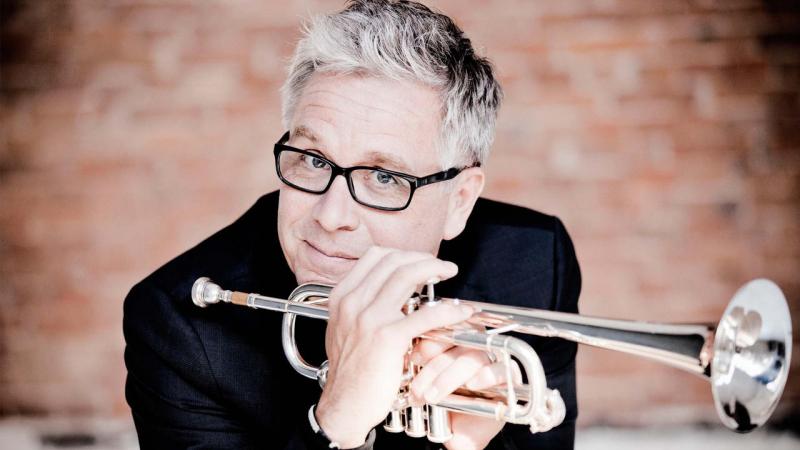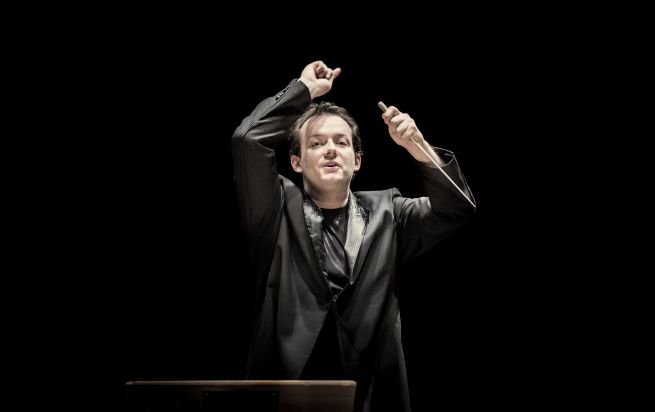Hardenberger, Philharmonia, Nelsons, RFH | reviews, news & interviews
Hardenberger, Philharmonia, Nelsons, RFH
Hardenberger, Philharmonia, Nelsons, RFH
Nelsons' Bruckner fails to convince

Bernd Alois Zimmermann’s Nobody knows de trouble I see is a popular concerto, but it’s an unlikely hit. Zimmermann maintains a distanced relationship with the spiritual on which the work is based, and, while there are jazz elements too, this is a long way from crossover.
Fortunately, both trumpeter Håkan Hardenberger and conductor Andris Nelsons (pictured below, image Marco Borggreve) have the measure of this music, giving a performance that fully acknowledges both the composer’s desire to connect with the radical jazz of the 1950s, and the loyalty to modernist conventions that prevent him from doing so. Hardenberger seemed more constrained than usual, effortlessly virtuosic, but without any flamboyant displays. The work has a pervasively dark mood that Hardenberger conveyed well, especially in the flat, broad tone that he applied. The orchestra is occasionally required to play the big band, with brass outbursts, and even a Hammond organ break at one point. But nothing here ever sounded laidback or casual. This was a performance fully in keeping with the spirit of the music, but what dark and unyielding spirit that is.
The Bruckner Eighth Symphony in the second half seemed a more attractive proposition, but failed to deliver. Nelsons’ approach to Bruckner is unusual. Where most conductors maintain a firm grip on the music’s large scale structure and progress while shaping individual phrases more intuitively, Nelsons puts all his structural rigour and energy into foreground concerns. So phrases are rarely allowed to play out at a natural pace, and cadences are frequently rushed or swallowed up into the texture. Even from the very opening of the work, the dotted rhythm theme in the lower strings sounded hectored and rushed, and most of what followed was very similar.

The second movement scherzo suffered least from Nelsons’ approach, and the steady pace, combined with a good bass tone from the lower strings, gave the music an appropriate sense of mechanistic propulsion. Adding a third harp helped to bring out their textures in the Trio and in the first part of the Adagio. But the remainder of the third movement was torpedoed by Nelsons’ erratic tempos, often speeding up the music simply because he didn’t seem to know what else to do with it. He used the Haas edition, an interesting and unusual choice. The main difference between this and the more standard Nowak is that many of the cuts to the Adagio and finale, which Bruckner himself sanctioned, have been opened out. But Nelsons failed to make a case for the longer Adagio, especially in the rambling and incoherent coda. So too with the finale, which also suffered from a lack of structural rigour and any real sense of direction.
None of this was helped by the surprisingly poor playing of the Philharmonia. Violin tone was weak throughout, especially in the Adagio, ensemble in the woodwinds was poor, the timpani was all but inaudible in the scherzo (although more prominent in the finale), and the brass tone at all the climaxes was ugly, with the trumpets frequently sharp.
This same orchestra has recently been giving stunning Bruckner performances under Christoph von Dohnányi, making Nelsons’ misjudged reading all the more frustrating. When it comes to Wagner, Mahler and Shostakovich, he’s a natural, but Bruckner remains a blind spot. Nelsons has recently been named Gewandhauskapellmeister, an appointment that comes with a heavy dose of Bruckner. Here’s hoping Leipzig audiences will be more convinced than I was.
rating
Share this article
Add comment
The future of Arts Journalism
You can stop theartsdesk.com closing!
We urgently need financing to survive. Our fundraising drive has thus far raised £49,000 but we need to reach £100,000 or we will be forced to close. Please contribute here: https://gofund.me/c3f6033d
And if you can forward this information to anyone who might assist, we’d be grateful.

Subscribe to theartsdesk.com
Thank you for continuing to read our work on theartsdesk.com. For unlimited access to every article in its entirety, including our archive of more than 15,000 pieces, we're asking for £5 per month or £40 per year. We feel it's a very good deal, and hope you do too.
To take a subscription now simply click here.
And if you're looking for that extra gift for a friend or family member, why not treat them to a theartsdesk.com gift subscription?
more Classical music
 Bizet in 150th anniversary year: rich and rare French offerings from Palazzetto Bru Zane
Specialists in French romantic music unveil a treasure trove both live and on disc
Bizet in 150th anniversary year: rich and rare French offerings from Palazzetto Bru Zane
Specialists in French romantic music unveil a treasure trove both live and on disc
 Scottish Chamber Orchestra, Ibragimova, Queen’s Hall, Edinburgh review - rarities, novelties and drumrolls
A pity the SCO didn't pick a better showcase for a shining guest artist
Scottish Chamber Orchestra, Ibragimova, Queen’s Hall, Edinburgh review - rarities, novelties and drumrolls
A pity the SCO didn't pick a better showcase for a shining guest artist
 Kilsby, Parkes, Sinfonia of London, Wilson, Barbican review - string things zing and sing in expert hands
British masterpieces for strings plus other-worldly tenor and horn - and a muscular rarity
Kilsby, Parkes, Sinfonia of London, Wilson, Barbican review - string things zing and sing in expert hands
British masterpieces for strings plus other-worldly tenor and horn - and a muscular rarity
 From Historical to Hip-Hop, Classically Black Music Festival, Kings Place review - a cluster of impressive stars for the future
From quasi-Mozartian elegance to the gritty humour of a kitchen inspection
From Historical to Hip-Hop, Classically Black Music Festival, Kings Place review - a cluster of impressive stars for the future
From quasi-Mozartian elegance to the gritty humour of a kitchen inspection
 Shibe, LSO, Adès, Barbican review - gaudy and glorious new music alongside serene Sibelius
Adès’s passion makes persuasive case for the music he loves, both new and old
Shibe, LSO, Adès, Barbican review - gaudy and glorious new music alongside serene Sibelius
Adès’s passion makes persuasive case for the music he loves, both new and old
 Anja Mittermüller, Richard Fu, Wigmore Hall review - a glorious hall debut
The Austrian mezzo shines - at the age of 22
Anja Mittermüller, Richard Fu, Wigmore Hall review - a glorious hall debut
The Austrian mezzo shines - at the age of 22
 First Person: clarinettist Oliver Pashley on the new horizons of The Hermes Experiment's latest album
Compositions by members of this unusual quartet feature for the first time
First Person: clarinettist Oliver Pashley on the new horizons of The Hermes Experiment's latest album
Compositions by members of this unusual quartet feature for the first time
 Gesualdo Passione, Les Arts Florissants, Amala Dior Company, Barbican review - inspired collaboration excavates the music's humanity
At times it was like watching an anarchic religious procession
Gesualdo Passione, Les Arts Florissants, Amala Dior Company, Barbican review - inspired collaboration excavates the music's humanity
At times it was like watching an anarchic religious procession
 Classical CDs: Camels, concrete and cabaret
An influential American composer's 90th birthday box, plus British piano concertos and a father-and-son duo
Classical CDs: Camels, concrete and cabaret
An influential American composer's 90th birthday box, plus British piano concertos and a father-and-son duo
 Cockerham, Manchester Camerata, Sheen, Martin Harris Centre, Manchester review - re-enacting the dawn of modernism
Two UK premieres added to three miniatures from a seminal event of January 1914
Cockerham, Manchester Camerata, Sheen, Martin Harris Centre, Manchester review - re-enacting the dawn of modernism
Two UK premieres added to three miniatures from a seminal event of January 1914
 Kempf, Brno Philharmonic, Davies, Bridgewater Hall, Manchester review - European tradition meets American jazz
Bouncing Czechs enjoy their Gershwin and Brubeck alongside Janáček and Dvořák
Kempf, Brno Philharmonic, Davies, Bridgewater Hall, Manchester review - European tradition meets American jazz
Bouncing Czechs enjoy their Gershwin and Brubeck alongside Janáček and Dvořák
 Solomon, OAE, Butt, QEH review - daft Biblical whitewashing with great choruses
Even a top soprano and mezzo can’t make this Handel paean wholly convincing
Solomon, OAE, Butt, QEH review - daft Biblical whitewashing with great choruses
Even a top soprano and mezzo can’t make this Handel paean wholly convincing

Comments
A grossly unfair review of
I must endorse the comments
I’ve tried posting a comment